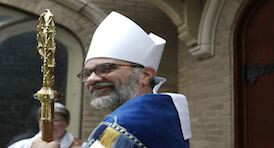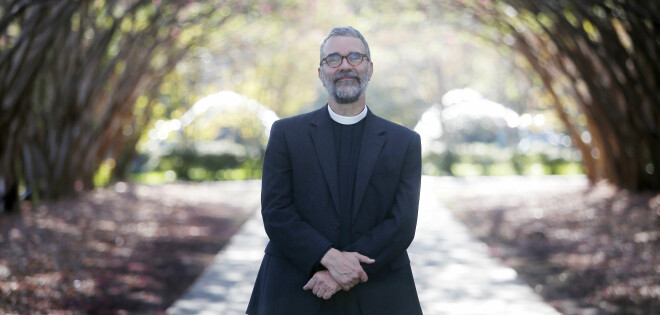The Comeback Kid

‘Dustbin of history’ is how the destiny of the doctrine of the Trinity was characterized, by the notorious Bishop James Pike, two generations ago. It seemed an anachronism, a mystification, just what modern theology could do without. How remarkably wrong he was! Ten years ago, it seemed that every dissertation or grant proposal needed the word ‘trinitarian’ to be plausible. While the Church was riven by conflict over moral teaching, on this much at least (and it is not small matter!) everyone was agreed.
Why did this happen? I like to think it was because of the beauty and profundity of the Trinitarian truth. But it also had historical reasons. Perhaps after the Second World War the witness of the church began to move to the edges of society. Perhaps the post-modern mind is more open to realizing that there are in the world ‘stranger things than are dreamed of in your (modern) philosophy…’ Surely the work of the great systematic theologians of the post-war era, figures such as Karl Rahner on the Catholic side and Karl Barth among the Protestants. They saw that thinking through seriously the Lordship of Jesus Christ takes you along a path parallel to that of the early Church and on to the triune nature of God.
That same Karl Barth loved his pipe. A Baptist student once challenged him to quit tobacco: ‘drown the old Adam, doctor!’ he said. Barth replied, ‘I have drowned him, but the fellow can swim!” Modernity is like that- it makes a comeback of its own. By this I mean that even the doctrine of the Trinity can become an occasion for contention in theology in the modern or post-modern era. For some the idea of the ‘social Trinity’ became a way to say that the divine is inherently communal, the ground of ‘I am because we are.’ For others the doctrine became a way to say that God is thoroughly implicated in human history. Both are true enough, but also susceptible to misunderstanding. God isn’t a metaphor for a quality of ours, and He isn’t working out His being in time. In fact, you might say that the heart of the Trinitarian witness is the very opposite of these errors!
Perhaps the best way to explain the matter, however, is itself historical. David Yeago, a Lutheran scholar now at Trinity, Ambridge, put it most simply. After the resurrection, the disciples worshipped Jesus as Kurios, as Lord. They anticipated the full revelation of His status and reign on His return, on the Day of the Kingdom. But Lordship is in (what we call) the Old Testament reserved for God of Israel, who is one. But this made sense to the disciples: worshipping Jesus His chosen was none other than worshipping the One at whose right hand He sits. He fulfills God’s plan, He and his Abba, are one, He is (in Mark) the ‘finger of God’ touching and forgiving His people. This all creates a trajectory. Emmaus begins a road that leads to Nicaea, not by some imposition of power, but by the inherent logic of the matter, the working out of the cry, Maranatha, ‘come, Lord Jesus.’
Peace
+GRS




